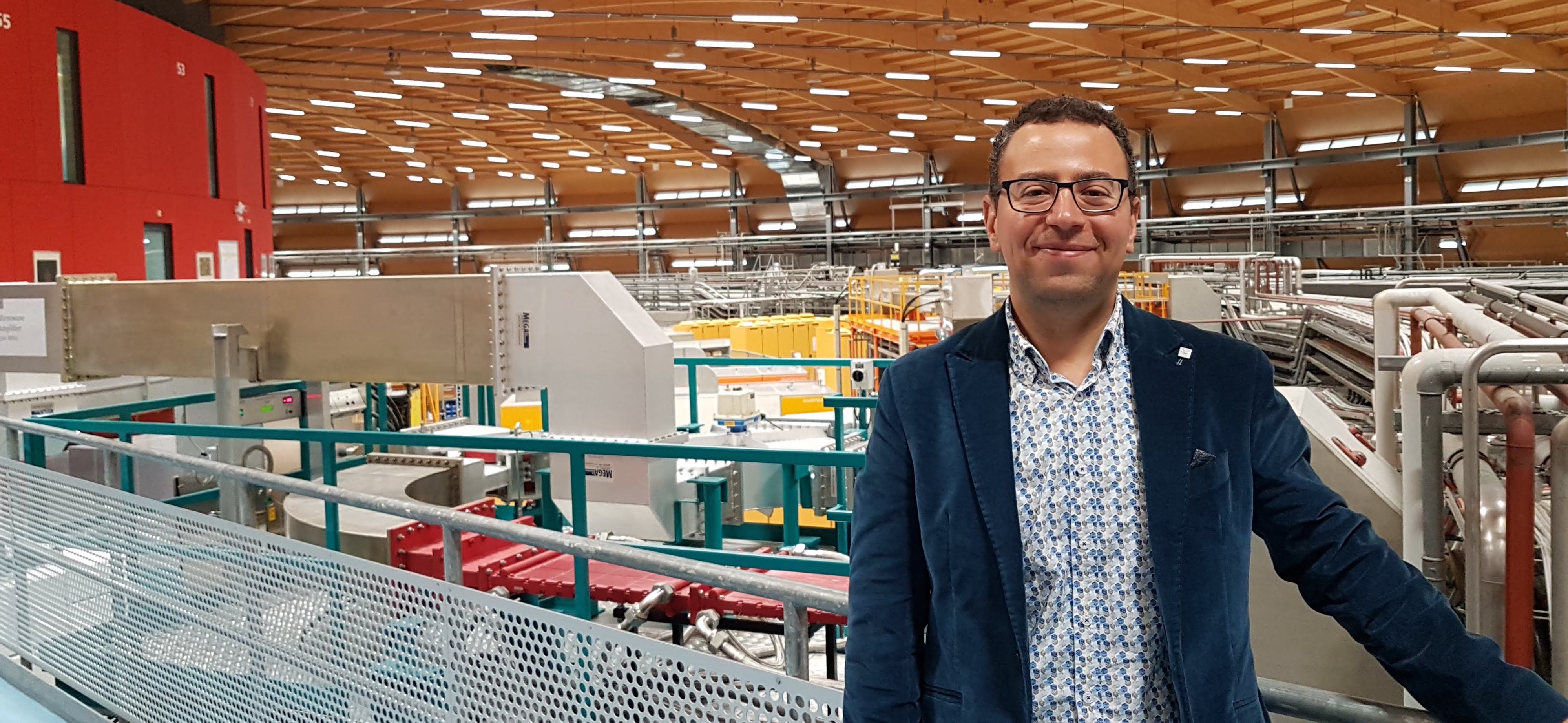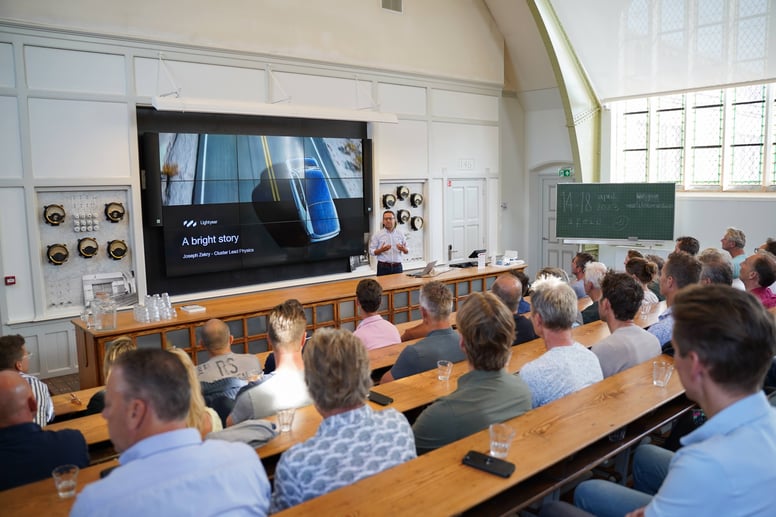


Born and raised in the Egyptian city of Aswan, Joseph Zekry now lives in Eindhoven with his Belgian wife and seven-year-old daughter. Describing himself as a “proud Belgian-Egyptian citizen,” watching his father doing maintenance on a large airplane is one of his earliest memories. From the pilot’s seat, the boy could have an amazing view of the airport, the desert around it, and the aircraft’s instrument panel. “It triggered something in me about traveling and exploring. Also, some kind of interest in leadership.” Whether it was a coincidence or a prediction, adult Joseph explored the world and filled leadership roles in remarkable technology companies, such as ASML and Lightyear. Inspired by Einstein’s doings, findings and life philosophy of constant curiosity, creativity and problem-solving – one of the reasons he went into physics – Joseph argues that the struggles one goes through can take a positive twist if we look at them as opportunities to learn crucial skills such as empathy.
Joseph comes from a Coptic family, an Egyptian religious group with a long history. Not belonging to the country’s Islamic majority influenced the boy. “I could see the world from a different perspective. Furthermore, being part of a minority often puts pressure on people to excel and compensate for missed opportunities. And that happened to me. I did push myself and excelled at school, and, subsequently, I wanted to attend the best universities in the country,” he acknowledges.
After his studies at the American University in Cairo, Joseph went to Belgium for scholarship research related to his master’s. Following that, he studied in the United States for one year before deciding to go back to Belgium for his Ph.D. (Pause for a heart-warming anecdote: his wife studied Arabic at the University in Leuven, and they met when she looked for volunteers to practice her language skills. They’ve been “happily married,” as he describes, since 2009.)
A purpose-driven individual
“As a young boy, I wanted to become a pilot,” Joseph shares, reflecting on his childhood dreams inspired by his father’s work as a technical officer in the Egyptian army. However, as he matured, he realized that a pilot alone couldn’t accomplish much without the aircraft. “For me, there was a shift from using a tool or a machine to doing a service where I could enable people to achieve their desires. And then technology stood up for me as a real enabler for people to grow, to progress, to develop society and so on.” As such, Joseph’s passion for technology and its potential to empower others took root early in his life.
Joseph pursued a bachelor’s degree in electrical engineering and telecommunications, focusing on expanding mobile networks in Africa and developing countries. This was followed by a master’s degree in physics and a Ph.D. at IMEC in Belgium, a renowned institution specializing in computer chips and partnering with ASML.
“The topic of purpose was previously unknown to me as a professional term, but if I look at my journey – all the travels I did, the people I met, the companies I worked for – it all had to do with giving back to society,” Joseph says. His passion for technology is interwoven with a sense of purpose, a desire to bridge the disparity between privileged and underprivileged communities, especially in Egypt, his homeland.
Searching for purpose in the Dutch environment
In 2013, Joseph joined ASML. This marked a pivotal moment in his career, as he had the opportunity to contribute to the digital revolution and make a global impact. His academic background had equipped him with knowledge, but he yearned for a more hands-on approach to create tangible change in society. “I wanted to be more in the driver’s seat of developing technology that is applicable today. So, I went to ASML to learn how to do that.” Nevertheless, the constant reminder of his initial self-mission was always there: Joseph couldn’t directly link his new role with his goal of helping the underprivileged people he had seen in Egypt when he was growing up.

And there, Lightyear came along. “A spark ignited in my head. In the Netherlands, electric cars are common, unlike in Egypt. Still, I realized that something needed to be done. Fossil fuels are not the future. Of course, in the Egyptian society, people have other urgent concerns, such as making a living to put food on the table. So, environmental issues are far from priorities. Furthermore, the infrastructure needed for electric cars is huge in that context. Lightyear had the complete package.” In Joseph’s mind, the Helmond-based company could offer something that could eventually transform a developing society like Egypt into a clean energy oasis. Joseph proudly worked as an Engineering Cluster Manager for the solar car designer until 2023.
A hands-on attitude to solve the gender gap issue
Growing up surrounded by strong women in his family – his mother and two elder sisters who became an engineer and a pharmacist – it was natural for Joseph to see women in technology or leadership positions. “So, when I came to Europe and saw the unequal situation of leadership roles in technology, it didn’t feel right. There is no reason women shouldn’t be company leaders, engineers or scientists,” he says. He also empathizes with women’s struggles in the corporate world and society in general due to his Coptic upbringing. “I can relate to their challenges navigating in a male-dominated industry because that’s kind of how I felt as a child: navigating a society that has a different identity than my own.” He quickly noticed his female colleagues were highly motivated, intelligent women trying to make an impact. However, he often spotted them putting in double the effort as their male counterparts but not being recognized for it.
For Joseph, this imbalance is a missed opportunity and a non-sustainable situation. “If we want to be more productive, more innovative and truly tackle the big challenges the world is facing, we cannot just rely on half the population. I won’t even get into the moral and human perspectives, but from a mere mathematical point of view, it doesn’t make any sense.” He believes the current scenario reflects traditional ways of thinking unconsciously kept in society – the famed gender roles.
For him, it’s clear that changes are crucial, but where and how do we start this revolution? From Joseph’s perspective, some principles could be helpful if widely employed: nurturing a sense of community (“connection is important”) and adopting an imbalanced solution for an imbalanced issue (“It’s like a scale. If it’s already pending to one side, you must compensate that somehow to reach balance. Therefore, being solely gender-neutral in your hiring processes will never fill in this gap.”) “It’s logical,” he argues.
The silver lining
Joseph praises the work carried out by the Fe+male Tech Heroes Network. For him, supporting such an initiative is natural and obvious because “by working towards bringing balance between females and males, you’re creating a community and an atmosphere where everyone who doesn’t feel they belong in the majority benefit.”
As an experienced leading figure, Joseph believes that one’s struggles, in fact, make them better leaders. “They make you more fit for the job. That’s frankly how I feel about the challenges I dealt with. Without them, I wouldn’t be the person I am today. I wouldn’t be able to lead and help people with their own struggles, be empathetic and understanding. So, it’s not a scar to hide but a badge of honor,” he said.
Joseph puts a positive twist on the issue by seeing difficulties as learning opportunities and, therefore, an advantage for females in tech has nothing to do with washing out the challenges. “By working more, you will learn more, making you sharper in your judgments. You will be automatically more driven to achieve amazing things, and your career will benefit from it, as well as your family and society. Nevertheless, it remains a struggle, and we must and will support each other.”